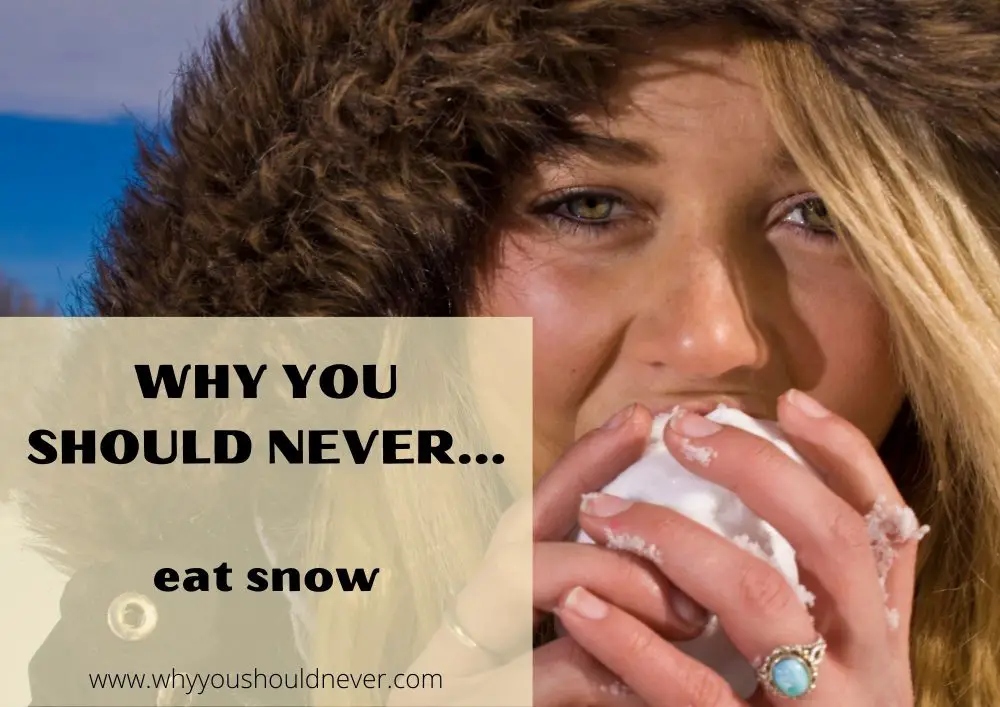![]()
Why You Should Never Eat Snow
We all know that eating snow is a winter pastime. It’s fun, it’s festive, and it’s a great way to cool down on a hot day. Children and adults alike love to indulge in a little snow-eating now and then.
Generally, snow is safe to eat. However, this comes with a caveat and is dependent on a number of factors. In this article, we’ll discuss some of the reasons why, though eating a small amount of snow might not kill you, it’s not necessarily a good idea.
8 reasons why you shouldn’t eat snow
1. It can give you a stomach ache
Eating snow can give you a stomach ache for several reasons. First of all, snow is cold, and consuming large amounts of it can lead to abdominal pain and cramping.
Secondly, if the snow is contaminated with bacteria or other contaminants, it can cause an upset stomach.
2. It can give you hypothermia
While eating snow will not cause hypothermia on its own, it can contribute to the condition. Hypothermia occurs when your body temperature drops below 95 degrees Fahrenheit.
Eating snow can lower your body temperature, as can being wet and cold. If you’re already cold and wet, and you eat snow, you’re more likely to develop hypothermia.
3. You might get brain freeze
Brain freeze, or ice cream headache, is a condition that can occur after eating cold foods. It is caused by the dilation of blood vessels in the head.
Symptoms include pain in the forehead or temples. Brain freeze typically goes away on its own within a few minutes. However, it can be quite painful while it lasts.
4. Snow can be contaminated
While pure, freshly fallen snow is unlikely to contain contaminants, once it hits the ground, it can become contaminated with dirt, animal feces, and other pollutants.
If you eat contaminated snow, you run the risk of becoming ill, as previously mentioned. The amount of contamination in snow varies depending on the location.
5. It’s flavorless
Let’s be honest, snow doesn’t have much flavor. In fact, it’s basically just water. If you’re looking for something to eat that’s going to taste good, it’s probably best to grab a slushie or some ice cream instead.
6. It’s not very filling
Snow isn’t going to fill you up. Since it’s mostly just water, it won’t do much to stave off hunger. It might even make you hungrier since you’ll be consuming empty calories.
7. There are no health or nutritional benefits
Snow has no nutritional content and provides no health benefits. It’s just water, after all. Granted, it is refreshing, but there are better ways to stay hydrated.
8. Yellow or brown snow… yikes!
Some types of snow should be avoided at all costs, and yellowish snow is one of them. You can bet your bottom dollar that yellow snow has been urinated on by an animal or human.
Likewise, brown snow is also a no-go. It’s often the result of people or animals trudging through it with filthy paws and shoes.
Conclusion
Look, at the end of the day, eating snow probably won’t kill you. It’s not as if you’re going to contract some rare disease from consuming a few flakes. A little bit of snow here and there is unlikely to do any harm.
But why on earth would you want to eat something that has no flavor, is not filling, and provides no nutritional or health benefits?!
If you simply must chomp down on some snow, be sure to do so in moderation and only eat freshly fallen, uncontaminated snow that hasn’t been on the ground very long. Any other snow is best avoided.
